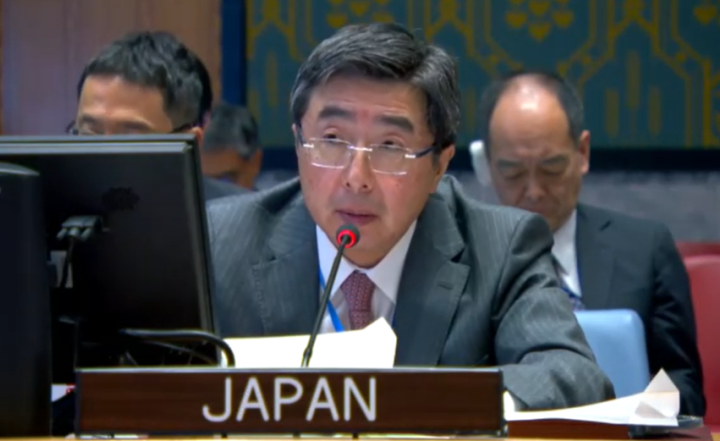Statement by H.E. Ambassador ISHIKANE Kimihiro, Permanent Representative of Japan to the United Nations, at the Security Council Ministerial Open Debate on “Threats to international peace and security: Transnational organized crime, growing challenges and new threats”
2023/12/7

Mr. President,
I highly appreciate your initiative to organize the meeting on a timely and important topic. I also thank the Secretary-General, UNODC Executive Director Waly, Professor Cammett and Ms Nyanjura for their briefings.
The world has witnessed a series of changes surrounding transnational organized crime. Widespread use of internet and new technologies have resulted in expanding the abuse of cyberspace for the purpose of organized crime and emerging threats such as crimes utilizing and targeting crypto assets.
We need to further strengthen capacity-building in countries, especially for those with vulnerable governance as it affects the security not just of these countries but also of regions and of the international community as a whole. Therefore, the Council needs to address this issue, and Japan welcomes the adoption of the Presidential Statement.
Mr. President,
Japan has been a strong supporter with the international community for the fight against organized crimes from the perspectives of "respect for fundamental human rights" and "promotion of the rule of law.”
In Hiroshima in May, Japan, together with leaders of many countries, reaffirmed their strong commitment to tackle transnational organized crime, including trafficking in drugs and persons.
Also, Japan is actively involved in the discussions of other multilateral frameworks such as the G20 and the Global Coalition Against Synthetic Drug Threats, which reaffirm the importance of addressing international organized crime, including corruption and drugs.
Japan has been contributing to the fight against transnational organized crime through the promotion of the free and open international order based on the rule of law. Specific examples include projects to support capacity building of criminal justice and law enforcement officials.
Mr. President,
Japan has been working with international organizations such as UNODC and INTERPOL to strengthen law enforcement capacity, including human resources development, in developing countries. In this regard, I would also like to highlight the importance of the implementation of UNTOC, which marks the 20th anniversary this year.
Japan continues to actively contribute to the reinforcement of the rule of law in the international community. We will also contribute to ongoing negotiations of future legal instruments, such as a new UN convention on Cybercrime, where we play a role of Vice-Chair of the Ad Hoc Committee for the elaboration of the future convention.
As part of these efforts, Japan plans to invite judges from Southeast Asian countries in February 2024 to participate in a training course on handling terrorism trials in Malta. In this way, Japan is committed to continue to promote the "rule of law" in Southeast Asia and beyond.
Mr. President,
Japan has allocated approximately 17 million US dollars as a part of the supplementary budget just approved by the Diet last week to the measures against such as cybercrime, drugs, and trafficking in persons or capacity building of customs authorities for countries in needs. Japan also has increased the amount of contribution to UNODC considerably from the previous year.
In conclusion, Japan is determined to further strengthen our partnership and work together with the international community to address the issue of transnational organized crime.
